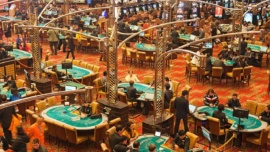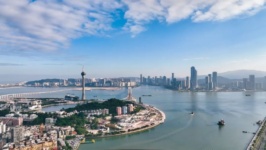More than a third of the Macau population has never been in a casino to gamble, a survey conducted by two academics from Shih Chien University in Taiwan concluded. ‘The social, economic, and environmental impacts of casino gambling on the residents of Macau and Singapore’ is the name of the study undertaken by Shou-Tsung Wu and Yeong-Shyang Chen. It examines the viewpoints of the Macau and Singapore population towards the gaming industry and its impact on both regions.
The sample for the study comprised 416 respondents from the Chinese Administrative Region, of whom 34.1 per cent (142) said that they have never been in a casino to gamble. Meanwhile, 12.3 per cent (51) said that they gamble frequently and the majority (56.3 per cent /223) admitted to gambling occasionally.
According to the results of the survey, which was conducted from March to June 2013, 27.9 per cent (116) of the residents of Macau have a negative view concerning the gaming industry. Of these, 94 persons said that their attitude towards gambling was “unwelcoming” while 22 defined gambling as “disgusting”. By contrast, 5.5 per cent (23) said gambling was “welcome”, while 28.9 per cent (120) said it was “acceptable”. The most common trend, however, was for people in Macau (37.7 per cent/157) to consider gambling as “not a big deal”.
The research also examined the availability for residents to work in the gaming industry. According to the findings, 58.4 per cent (243) of Macau residents surveyed said that they would like to work in the gaming industry, while 41.6 per cent (173) said they would not like to work in this field.
Casinos causing rising rents?
In terms of the economy, the gaming industry is perceived as trigging inflation, resulting in rising home rents and the higher cost of goods. Despite stressing these negative factors, however, the respondents said they do not believe that the gaming industry would cause the bankruptcy of small and medium enterprises or narrow the job opportunities for young people.
One of the most important consequences of the gaming industry for Macau respondents was its role of promoting the popularity of the city. Singaporean residents also stress the importance of the gaming industry in promoting the popularity of their region.
As for the benefits of the industry, Macau residents also highlighted that it would result in enhancing tourist sites and infrastructure.
Contrary to what might be expected, the residents of the Chinese Administrative Region did not consider that gaming causes serious environmental pollution.
‘The residents of Macau accept every benefit of casino gambling but unavoidably encounter its negative impact. Therefore, the development of casino gambling definitely triggers intricate emotions in the minds of local residents’, the study stresses.
As Shou-Tsung Wu and Yeong-Shyang Chen compare the cases of Macau and Singapore as gaming hubs, the researchers explained that despite the increasing importance of gaming, Singapore had managed to create a lot more non-gaming attractions, differentiating it from the former Portuguese enclave. For the academics, Singapore is more a family tourism destination, while Macau is a hardcore gaming destination.
‘Non-gaming attractions allow Singapore to differentiate itself from Asia’s casino capital of Macau by strategically developing Singapore as a family tourism destination rather than Macau’s heavy dependence on the exclusive revenues of gambling or gambling-hotel complexity’, it concluded.























